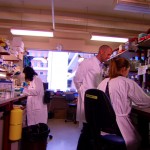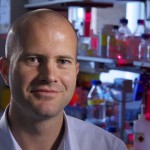 Benjamin Kile
Benjamin Kile
Benjamin Kile is unravelling the secrets of blood in a series of discoveries at the Walter and Eliza Hall Institute for Medical Research in Melbourne.
He has discovered why platelets—the blood cells responsible for clotting—have a short shelf life at the blood bank. There’s a molecular clock ticking away that triggers cell death.
And he has discovered a gene that’s critical for the production of blood stem cells in our bone marrow. It turned out that the gene was already well known to science—but as a cancer gene, associated with a range of different cancers.
These discoveries are just the beginning for this young scientist. Now he is using them to try and extend the life of blood bank products, and to get to the heart of some big questions in cancer. What causes good cells to go bad? How does cancer start?
For his achievements in molecular genetics, Benjamin Kile receives the 2010 Science Minister’s Prize for Life Scientist of the Year.
Ben’s father, a forest pathologist with CSIRO, was the first to imbue him with an interest in science. As a kid he was excited by astronomy and the physical world. School biology introduced him to genetics and DNA.
At university, he was underwhelmed by the science component of his joint science/law degree and planned to become a lawyer. He never quite got there. An Honours degree exposed him to real science, working with ‘knockout mice’ to study how cells divide faithfully. Summer work at CSIRO led to an introduction to Doug Hilton at the Walter and Eliza Hall Institute in Melbourne and a PhD looking at the role of cytokines in cancer and blood cell formation.
For his postdoc he moved to the heart of the genome revolution—Baylor College in Houston—where hundreds of robots were sequencing the mouse and human genomes and generating a vast amount of data. Large research teams were busy attempting to harvest that data.
“It was an incredible experience,” says Ben. “Baylor had more money than the NHMRC. I became the blood guy, looking for genes playing a role in blood.” He re-engineered classic gene screening techniques and showed how it could be used to screen large sections of the mouse genome to determine what the genes were doing.

In 2004 Ben returned to the Walter and Eliza Hall. He thought that if he narrowed his focus to a particular blood cell type there would be significant discoveries to be made.
Blood is involved in almost every disease, from malaria to diabetes to cancer. All blood cells start from stem cells, mostly in bone marrow, but there’s much we don’t know about how it works—how blood cells are created, regulated and terminated.
Ben chose to focus on platelets—the small cells involved in blood clotting. If there are too many platelets then blood clots form where they shouldn’t. Too few platelets and you can bleed to death. That’s a big issue for cancer patients who need transfusions of platelets to replace those destroyed by chemotherapy. But platelets have to be kept at room temperature and only survive for a short period out of the body. By the time they’re harvested and reach the shelf at the blood bank they are usually only good for five days.
Ben discovered that platelets are programmed to die. “Platelets don’t just wear out,” he says. “We showed that there is a molecular clock counting down. And now we’ve shown that, in mice, we can slow it down or speed it up.”
Could they do the same with human platelets? Perhaps. But first they need to know why survival is so tightly regulated. That’s one of Ben’s current research directions.
In addition, the genes that regulate platelet survival are playing key roles in stem cells and the production of platelets. The way these genes behave affects the development of cancer and how the body responds to cancer therapy.
Ben’s second major discovery came while he was investigating how platelets are made. With colleagues, he found a gene that regulates the development of blood stem cells. Without it, there is no blood.
By itself this was an important discovery. But when he took a look at the literature he found that this gene was already well known as a cancer gene. Known as ERG, it had been implicated in many different cancers. It’s probably associated with more cancers than any other gene. “But no one knew what its day job was,” he says.
“This gene links our studies of blood stem cells and our studies of cancer,” says Ben. Stem cells and cancer cells share the ability to keep growing and dividing. This link may help understand how cancer starts—how cells go bad.
Qualifications
| 2001 | PhD (Molecular genetics), University of Melbourne |
| 1997 | Bachelor of Science (Honours), University of Melbourne |
| 1995 | Bachelor of Laws, Monash University, Melbourne |
| 1993 | Bachelor of Science, Monash University, Melbourne |
Career highlights, awards, fellowships and grants
| 2008-present | National Health and Medical Research Council (NHMRC) Senior Research Fellow, Viertel Fellow, Laboratory Head and Faculty Member, Division of Molecular Medicine, The Walter and Eliza Hall Institute of Medical Research (WEHI), Melbourne |
| 2009-2013 | Sylvia and Charles Viertel Charitable Foundation Senior Medical Research Fellowship. |
| 2009-2011 | NHMRC Grant: Bcl-2 proteins and the regulation of the megakaryocyte lineage. BT Kile, C James. |
| 2009-2010 | Collaborative Research and Development Agreement with MuriGen Therapeutics Pty Ltd: Anti-apoptotic agents. BT Kile, DCS Huang. |
| 2008-2010 | NHMRC Project Grant: The molecular regulation of platelet life span. BT Kile, SP Jackson, AW Roberts. |
| 2008 | Burnet Prize, WEHI, Melbourne |
| 2007 | Australian Institute of Policy and Science Victorian Young Tall Poppy Award |
| 2005-2008 | Queen Elizabeth II Fellowship, Australian Research Council |
| 2004 | NHMRC Industry Fellowship |
| 2001-2003 | Leukemia Research Foundation Postdoctoral Fellowship, Baylor College of Medicine, Houston, USA |
Research highlights
- Conducted the first large-scale recessive mutagenesis screen in the mouse: re-engineered classic gene screening techniques and showed how they could be used to screen large sections of the mouse genome to determine what the genes were doing
- Uncovered the role of ERG—a gene long-known to be associated with cancer. Showed ERG is required for definitive hematopoiesis, adult hematopoietic stem cell function and the maintenance of normal peripheral blood platelet numbers
- Discovered the molecular clock that determines the lifespan of platelets.
Header image: Benjamin Kile, winner of the 2010 Science Minister’s Prize for Life Scientist of the Year (photo credit: Bearcage Productions)

